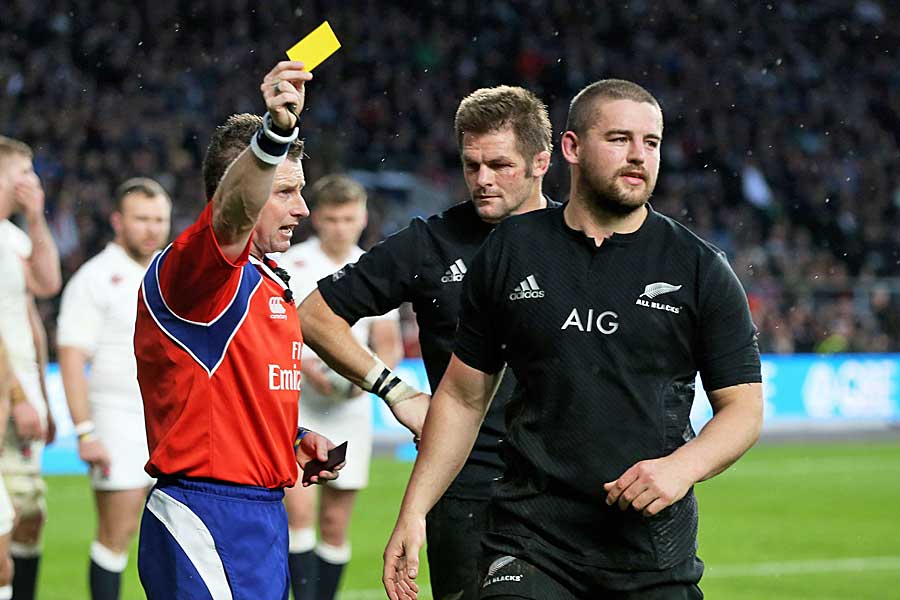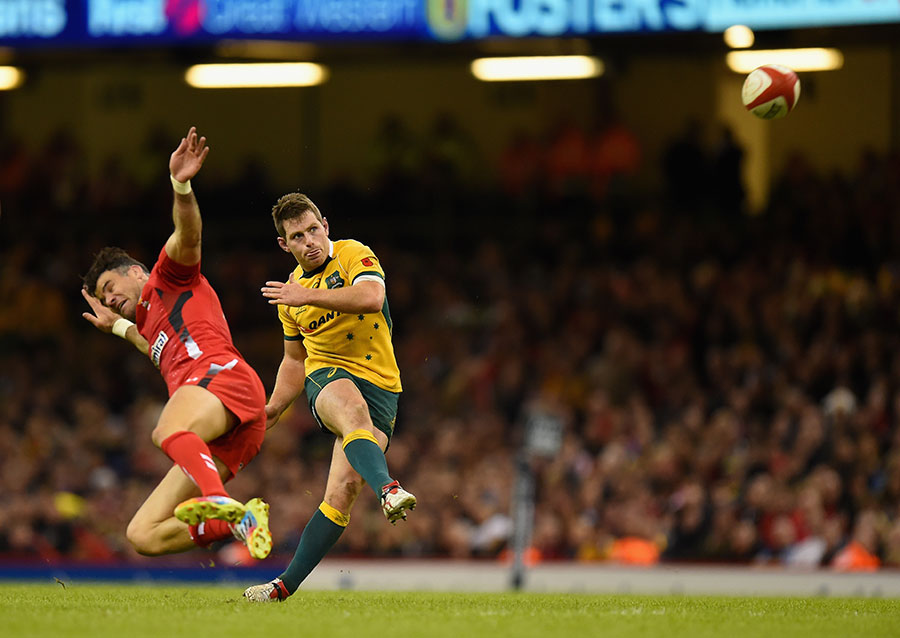|
Psychology in rugby
Southern dominance built on mental cement
Sam Bruce
November 18, 2014
Lancaster: Frustrating loss, but England making progress
Another week, another narrow defeat for England in November. It's a feeling that's all too familiar for coach Stuart Lancaster and the Twickenham faithful. A couple of hundred kilometres down the road in Cardiff, the Welsh are sick and tired of being pipped at the post by the Wallabies; it's 10 straight defeats to be exact. In Scotland, things are on the up. A win over Argentina and a gallant effort against an experimental All Blacks side suggest the dark days of Scottish rugby might be coming to an end. But they have a ways to go yet. And then there's Ireland. The men in green have been the pick of the home unions in recent times, having defeated the Springboks this November after pushing the All Blacks to the death this time last year. Joe Schmidt looks to be doing a fine job. But the reality is that the home unions have won just two of 14 Tests in the past two November Test series to date. It's a dominance that's run throughout the 20 years of rugby professionalism as the SANZAR nations continue to find ways to win even if the margins continue to decrease. It's fast becoming more and more of a mental issue, and that's exactly why sports psychologists such as Professor Pieter Kruger are playing a greater role in the rugby world. "I think in the beginning the gap between certain teams in terms of physical preparation, nutrition, tactical, technical sorts of strategies was much bigger - moreso nowadays everybody seems to be level on the basics," Kruger, who works with South Africa's Lions and Harlequins in London, told ESPN in an exclusive interview. "And this is the role of psychology -it's the cement holding the other things together. So hence the reason why it's such a big emphasis nowadays for quite a lot of the really good teams." England have been trying to turn Twickenham into a fortress before Rugby World Cup 2015, and were talking tough ahead of their opening November encounter against New Zealand. Skipper Chris Robshaw spoke of the need to be clinical against the All Blacks but it was little more than lip service as they made a host of errors while former England prop and ESPN columnist Phil Vickery spoke of the self-belief and intensity needed to defeat the All Blacks. "The secret to beating the All Blacks is fairly simple - it lies within you," Vickery wrote. "It comes down to your belief and mentality. Tactics against the world's best team only do so much; you have to take yourself to another level of intensity and concentration to a place where you repeat everything you do perfectly. Changes will be made - Lancaster
%]"Some teams have a defeatist mentality before they take to the field, they believe if they can keep the All Blacks down to something below a cricket score, then that is a moral victory. England do not have that mindset and each and every one of those 15 players who run out on Saturday have to truly believe they are better than their opposite number. Looking at England's last two games at Twickenham against New Zealand, in 2012 the All Blacks looked shocked. England went out and got after them and kept on going. But in 2013, England began terribly. You cannot allow New Zealand to have a 14-point head start." England have lost their last two clashes at home to New Zealand, and five on the trot, and they haven't beaten the Springboks since 2006. They've been right in contention in the two most recent of those encounters - this year's November series - but have failed to land the final punch; it's a fact Kruger believes can be directly correlated to confidence and the ability of the brain to function under pressure. "Confidence is quite an interesting thing. You get various levels of confidence; it's very situation specific," he said. "It's got a lot nowadays to do with the neural psychology of how our brain functions under pressure. And this is where I've spent a lot of my time trying to figure out, analyse and improve players and teams in that respect because confidence is quite a difficult thing to work on and because it is a result of the fact that it is so situation specific." The pressure situations have come thick and fast for England in November; they drew level at 20-all with the Springboks after half-time at the weekend before fading to 31-28 defeat, and they led the All Blacks 14-11 at oranges seven days earlier. They also enjoyed a one-man advantage for 10 minutes after the break in that former clash but were outscored 3-0 while Dane Coles was in the sin-bin. 
England failed to make the most of Dane Coles' sin-binning at Twickenham © Getty Images
Enlarge
And it's here where Kruger says the southern hemisphere nations - New Zealand and South Africa in particular - hold a distinct mental edge; a bank of confidence achieved by the ability to execute in the "critical moments". "Confidence from a neuro-psychological perspective is very much a function of memory," he said. "I think it's a good definition to sort of summarise it by saying it's the ability to recall previous experiences where you've done something well. Now because of the dominance of the southern hemisphere, I think initially as a result of physical, technical and tactical abilities, they started building up this level of confidence. It's a bit of social inheritance that will be carried over to the next teams coming in. And I think that as a result of that, there's definitely a little bit of a mental block still when it comes to northern hemisphere teams playing southern hemisphere teams, although this gap is getting increasingly smaller. "And this is why a lot of the teams are now exploring every possible strategy they can, psychologically as well, to try and keep that edge." Meanwhile, Wales' inability to defeat Australia despite leading 28-27 following a penalty try - an incident regarded as a devastating psychological blow - means the Dragons under Warren Gatland have recorded just one victory from 26 Tests against the All Blacks, Springboks and Wallabies. Not all those contests have been close, but there have been more than just a few incidents - particularly against Australia - when a lack of confidence has cruelled Wales and Kruger believes "panic" sets in. "This is where the mind is having a pretty big impact on teams like Wales; it has to do with the critical moments," Kruger said. "And when I say critical moments in psychology I mean that sort of tipping point where the result really matters and it's genuinely high pressure. And what you'll see is there are some interesting neurological shifts that are happening in the brain. 
Bernard Foley's drop goal secured the Wallabies a 10th straight win over Wales © Getty Images
Enlarge
"And just taking back to the confidence factor for the moment; [it's tough] if you don't have that memory bank of previous experiences where you've pulled this through - that you know the 14 guys around you will step up and deliver the goods. I do think that not everybody in the team necessarily does it, but I think you do see large numbers of players falling into this fright-of-flight mode where panic does kick in a little bit. And perception is a nasty thing, and I think southern hemisphere teams exploit that very well." That might not be so true for the Wallabies at the moment, after Bernard Foley offered Wales one last chance by kicking the ball away with 30 seconds on the clock in Cardiff last week - and after they failed to capitalise fully on their one-man advantage in the final stages against France in Paris at the weekend. But for the All Blacks, who snatched victory via a Malakai Fekitoa try in Bledisloe III after Nic White gave away possession in the closing stages, it could not be more apt. "I think that's why teams like New Zealand, for example, can in the death end of games, the 81st, 83rd minute still come through because their confidence is 'we've been here, we've done this before, let's just stick to the processes'," Kruger said. "They don't fall back into that mode where they get panicky about it; they trust the guy next to them, it's task-focused and they go through and usually when you focus on these things the result will take care of itself." © ESPN Sports Media Ltd
|
Live Sports
Communication error please reload the page.
-
Football
-
Cricket
-
Rugby
-
- Days
- Hrs
- Mins
- Secs
F1 - Abu Dhabi GP
Abu Dhabi Grand Prix December 11-131. Max Verstappen ()
2. Valtteri Bottas (Mercedes)
3. Lewis Hamilton (Mercedes)
4. Alexander Albon ()
5. Lando Norris ()
6. Carlos Sainz Jr ()
-
ESPNOtherLive >>
Boxing - Nelson v Wilson; Simmons v Dickinson; Joshua v Gavern (Metro Radio Arena, Newcastle)
Golf - Houston Open
Snooker - China Open
Tennis - Miami Open

